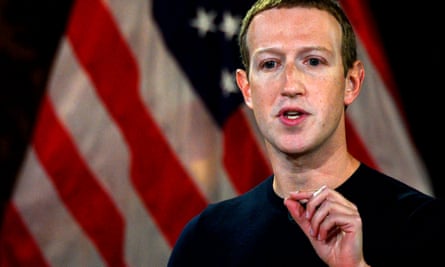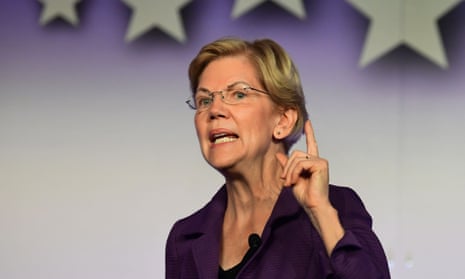More than two hours into the Democratic debate in Ohio on Tuesday night, after discussions on healthcare, gun control and foreign policy, the moderators turned to another issue that sharply divided the candidates: is it time to break up Facebook?
The question was framed slightly differently: is Elizabeth Warren right?
Over the last year, the Massachusetts senator has been at the vanguard of the debate about breaking up big tech companies, helping move the issue on to the political agenda. In doing do, she has been drawn into sharp conflict with the company’s CEO, Mark Zuckerberg.
The question went first to Andrew Yang, a former tech entrepreneur.
“As usual, Senator Warren is 100% right in diagnosing the problem,” he replied, before laying out why he disagreed with her plan to break up the titans of the tech industry – Facebook, Google, Amazon – and regulate them more heavily.
The candidates then grappled with the issue for the first time in a meaningful way during a presidential debate. From breaking up the the largest companies, to data privacy legislation, political fundraising in Silicon Valley and whether Donald Trump should be banned from Twitter, the discussion illustrated a deepening disenchantment with big tech – and why Zuckerberg fears a Warren presidency would “suck for us”.
‘They’re begging for regulation’
Zuckerberg’s comments, made to employees, were not meant to be made public. But their leak this month triggered a very public showdown between the fast-rising frontrunner for the Democratic nomination and one of the most powerful executives in the world – a fascinating subplot of the 2020 primary.
“It is the one thing that the CEOs of these companies absolutely hate,” said Sarah Miller, deputy director of the Open Markets Institute, a Washington-based thinktank that advocates against monopolies.
“They’re begging for regulation because they know they game it, they know they can shape it, they know they can avoid it and they know that it will likely inhibit their competitors who won’t have the same resources. But, more than anything, they do not want to be broken up.”
Warren wants to regulate tech platforms as utilities, targeting companies that earn $25bn or more in global annual revenue. She would appoint regulators to unwind “illegal and anticompetitive tech mergers”.
“Today’s big tech companies,” she said, announcing her policy, “have too much power – too much power over our economy, our society and our democracy.”
According to audio recordings leaked to the Verge, Zuckerberg called Warren’s plan an “existential” threat.
“If she gets elected president,” he said, “then I would bet that we will have a legal challenge, and I would bet that we will win the legal challenge.”
“What would really ‘suck’,” Warren tweeted in reply, “is if we don’t fix a corrupt system that lets giant companies like Facebook engage in illegal anticompetitive practices, stomp on consumer privacy rights and repeatedly fumble their responsibility to protect our democracy.”
The war of words escalated after Facebook’s decision to allow Trump’s re-election campaign run a $1m ad campaign containing lies about Joe Biden. Warren responded by placing her own ad on Facebook.
It started with Warren announcing “Breaking News”, before declaring that Zuckerberg and Facebook were supporting Trump’s re-election. Warren then says, “You’re probably shocked, and you might be thinking, ‘How could this possibly be true?’ Well, it’s not.”
The point Warren was making is that by allowing her ad, Facebook was showing itself to be a “disinformation-for-profit machine”.
Since the Cambridge Analytica scandal broke, Zuckerberg has worked to smooth relationships with politicians in DC. But Warren seems in no mood to play nice. The two sparred again after Zuckerberg defended Facebook in a speech at Georgetown University in Washington on Thursday.
“We can continue to stand for free expression, understanding its messiness, but believing that the long journey towards greater progress requires confronting ideas that challenge us,” Zuckerberg said, speaking in the ornate Gaston Hall, where presidents and foreign dignitaries have delivered major addresses. “Or we can decide the cost is simply too great. I’m here today because I believe we must continue to stand for free expression.”
Warren’s response was withering: “Mark Zuckerberg’s speech today shows how little he learned from 2016, and how unprepared Facebook is to handle the 2020 election.”
‘Mark’s power is un-American’
Warren has taken the most aggressive posture toward big tech, part of a call for “big, structural change” to the American economy. After she introduced her proposal in March, her campaign put up a billboard near a busy transit station station in San Francisco that said in capital letters: “Break up big tech”.

Before the latest debate, the Massachusetts senator announced that she would not take contributions of more than $200 from “executives at big tech companies”, even as employees of those companies help power her campaign.
Warren has attracted an interesting ally: Chris Hughes, who co-founded Facebook with Zuckerberg at Harvard. Last week, the organization he co-chairs, the Economic Security Project, announced the creation of a $10m “anti-monopoly fund”.
Writing in the New York Times in May, Hughes said Zuckerberg’s influence had far exceeded “anyone else in the private sector or government” and said Facebook’s concentration of wealth, power and influence – 2.7bn people use it or its other platforms, including Instagram and WhatsApp, each month– posed a threat to democracy itself.
“Mark’s power is unprecedented and un-American,” Hughes wrote. “It is time to break up Facebook.”
Nick Clegg, the former British deputy prime minister who is now Facebook’s vice-president for global affairs and communications, responded in the New York Times later that month: “Facebook shouldn’t be broken up – but it does need to be held to account. Anyone worried about the challenges we face in an online world should look at getting the rules of the internet right, not dismantling successful American companies.”
The drive to break up Facebook has plenty of critics who agree the company has too much power but do not believe such action would address many of the major concerns with the platform, including how to strengthen user privacy protections, improve election security and stop propaganda intended to incite violence and extremism.
In a Washington Post op-ed earlier this year, shortly after Warren unveiled her plan, Zuckerberg called for “updating the rules of the internet” and outlined four areas where he said new regulation was needed: “Harmful content, election integrity, privacy and data portability.”
Dipayan Ghosh, a co-director of the Platform Accountability Project at the Harvard Kennedy School, has argued breakup is not the only way to thwart Facebook’s capacity for “capitalistic overreaches” and “economic exploitation”. He favors a “novel, stringent” set of “pro-competition policies”.
“We need to say to Facebook, ‘We’re going to treat you like a public utility, like AT&T or the electric company,” Ghosh said. “We are going to make sure you can’t make any mergers or acquisitions, we’re going to tax you heavily, we are going to develop stringent privacy regulations that you’re going to need to follow.”
There are those who argue Facebook should not be singled out by a president, as the former congressman Beto O’Rourke said during the Democratic debate. Senator Amy Klobuchar of Minnesota, the top Democrat on the Senate antitrust subcommittee and another presidential contender, advocated for bolstering regulatory agencies to promote competition.
The debate underscored a broad consensus: that tech companies wield far too much power and influence.
“It’s remarkable that virtually all of these candidates are saying that there are a handful of tech companies that have too much power,” said Stacy Mitchell, co-director of the Institute for Local Self-Reliance. “If you turn the clock back even just three years, the idea that that discussion would have happened would seem pretty far-fetched.”
‘Dinners with lots of people’
Silicon Valley has faced a reckoning in Washington since 2016. But the events of the past few weeks have sharpened the divide and pulled Zuckerberg far more publicly and personally into the political maelstrom.
He is expected to testify on Capitol Hill this week, for the first time since he faced a public grilling in April 2018 over the company’s handling of user information, whether it should be more heavily regulated, alleged censorship of conservative content and the extent of Russian meddling. In the 18 months since, Democrats and Republicans have only grown more frustrated, setting the stage for another contentious hearing.
Republicans have long alleged that Facebook silences conservative personalities and websites, charges the company denies. According to Politico, Zuckerberg has hosted conservative lawmakers, commentators and journalists, including Senator Lindsey Graham of South Carolina, the Fox News host Tucker Carlson and the radio host Hugh Hewitt, at his California home over the past several months.
Zuckerberg appeared to confirm the report in a Facebook post, writing that he had “dinners with lots of people across the spectrum on lots of different issues all the time.
“Meeting new people and hearing from a wide range of viewpoints is part of learning,” he said. “If you haven’t tried it, I suggest you do!”
Regardless of who wins the White House in 2020, Facebook’s political and legal woes show no sign of relenting.
The audio of Zuckerberg leaked just weeks after state attorneys general from both parties opened an antitrust investigation.
This summer, Facebook agreed to pay a $5bn fine as part of a settlement with the Federal Trade Commission over privacy violations in connection with the Cambridge Analytica scandal. The new settlement order requires Facebook to improve the way it handles its users’ personal information and to designate an employee tasked with coordinating those efforts.
Just last week, the Democratic senator Ron Wyden of Oregon, a prominent critic of big tech, introduced a bill that would strengthen privacy protections and threaten to jail Silicon Valley executives who knowingly lie to the FTC.
“Mark Zuckerberg won’t take Americans’ privacy seriously unless he feels personal consequences,” Wyden said in a statement. “A slap on the wrist from the FTC won’t do the job, so under my bill he’d face jail time for lying to the government.”
